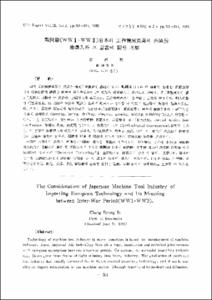北方政策과 統一政策
- Alternative Title
- The relationship between Northward and Unification policies in South Korea
- Abstract
- 平和統一을 이룩하는 길은 葛藤 및 對立을 止揚하고 相互交流와 信賴 및 協力의 바탕을 마련하는데 있다.
最近의 國際社會는 對決에서 和解로 分斷에서 統-로 가고있으며 이데올로기의 雨極이 점차 무너지는 樣相을 나타내고 있다. 그러나 韓半島만은 40여년 동안 冷戰의 狀態만 계속되어온 채 統一을 열망하는 南 ·北韓民族 및 離散家族의 마음을 아프게 하고 있다.
이러한 硬直된 雰圍氣속에서 東歐事態의 變化 및 고르바초프(Mikhail 5.Gorbachev)의 一大改革政策은 革命的인 것으로 이것이 北韓의 金日成(Kim IL-sung)體制 및 南·北關係에 어떤 영향을 미치는 가를 알아본다.
特히 韓半島周邊 强大國인 中國, 蘇聯를 中心으로한 우리의 北方政策이 統一政策에 미치는 影響을 中心으로 考察하여 본다.
There is an agreement that South and North Koreas can be unified in peace through establishing a basis for mutual support and cooperation as well as for mutual commutation by resolving conflicts and antagonism between the South and the North. At recent years, international relationships have been changing from contention to reconciliation, and from division to unity. Moreover, polarized ideological confrontations between two worlds-liberal capitalists and social communists - are gradually diluted and dissolved. By contrast, South and North Korean relationships have been in cold war for the last 40 and more years. All the Korean who wishes to achieve unification and those families separated between the South and the North are eager to be one. In this rigid situation, the revolutionary changes in Eastern Europe and reformative policies of President Mikhail S. Gorbachev in Soviet Unions have brought about tremendous impacts on socio - economic and political relationships of both capitalist and communist worlds.
This paper is designed to investigate the impacts of changes in Eastern Europe and Soviet Unions on Kim Il-sung regime in North Korea and on the relationship of South and North Korea. Especially focusing on the relationship with China and Soviet which are two powerful nations around the Korean Peninsula, I intend to show how the Northward policies of South Korea influence and condition unification policies and to find out the effects of those policies on the South - North relationship.
There is an agreement that South and North Koreas can be unified in peace through establishing a basis for mutual support and cooperation as well as for mutual commutation by resolving conflicts and antagonism between the South and the North. At recent years, international relationships have been changing from contention to reconciliation, and from division to unity. Moreover, polarized ideological confrontations between two worlds-liberal capitalists and social communists - are gradually diluted and dissolved. By contrast, South and North Korean relationships have been in cold war for the last 40 and more years. All the Korean who wishes to achieve unification and those families separated between the South and the North are eager to be one. In this rigid situation, the revolutionary changes in Eastern Europe and reformative policies of President Mikhail S. Gorbachev in Soviet Unions have brought about tremendous impacts on socio - economic and political relationships of both capitalist and communist worlds.
This paper is designed to investigate the impacts of changes in Eastern Europe and Soviet Unions on Kim Il-sung regime in North Korea and on the relationship of South and North Korea. Especially focusing on the relationship with China and Soviet which are two powerful nations around the Korean Peninsula, I intend to show how the Northward policies of South Korea influence and condition unification policies and to find out the effects of those policies on the South - North relationship.
- Issued Date
- 1990
- Type
- Research Laboratory
- Alternative Author(s)
- Lee, Myung-Soo
- Publisher
- 연구논문집
- Language
- kor
- Rights
- 울산대학교 저작물은 저작권에 의해 보호받습니다.
- Citation Volume
- 21
- Citation Number
- 2
- Citation Start Page
- 93
- Citation End Page
- 113
- Appears in Collections:
- Research Laboratory > University of Ulsan Report
- 파일 목록
-
-
Download
 000002024701.pdf
기타 데이터 / 759.13 kB / Adobe PDF
000002024701.pdf
기타 데이터 / 759.13 kB / Adobe PDF
-
Items in Repository are protected by copyright, with all rights reserved, unless otherwise indicated.